Overview
The article titled "10 Essential Google Paid Search Keywords for Tech Startups" highlights a significant challenge faced by technology startups: the struggle for visibility in a competitive landscape. Many founders find themselves overwhelmed by the myriad of options available for Google Ads, which can lead to frustration and uncertainty. It's crucial to recognize that without the right keywords, even the best campaigns can fall flat, leaving startups feeling disheartened and underappreciated.
This situation can be particularly painful, as the stakes are high for tech startups. Limited budgets and resources mean that every dollar spent on advertising needs to count. The pressure to achieve growth can feel immense, and without strategic keyword selection, effective ad extensions, and ongoing optimization, the dream of success can seem just out of reach.
However, there is hope. By focusing on the right keywords and continuously refining their approach, tech startups can enhance their ad performance and work towards achieving a significant return on investment. It's about more than just numbers; it's about creating connections and fostering growth. We encourage you to explore these strategies, share your experiences, and remember that you are not alone on this journey. Together, we can navigate the complexities of Google Ads and build a brighter future for your startup.
Introduction
In the ever-evolving world of technology startups, many founders find themselves grappling with the daunting task of establishing a strong online presence. This challenge is not just about visibility; it’s about connecting with potential customers who are actively searching for the products and services they offer. The pain of feeling invisible in a crowded marketplace can be overwhelming. However, there is hope. By harnessing the right Google paid search keywords, emerging businesses can significantly enhance their visibility and reach those who need them most.
As we look toward 2025, it’s essential to explore the key strategies and keywords that can truly propel tech startups toward their marketing goals. This article will delve into ten pivotal Google paid search keywords and strategies, providing insights designed to transform your advertising efforts and foster growth in a competitive landscape. Together, we can navigate these complexities and find the path to success.
RNO1: Comprehensive Branding Solutions for Tech Startups
In the fast-paced world of technology startups, many founders grapple with the challenge of establishing a strong brand identity. This struggle can lead to feelings of uncertainty and frustration, especially when trying to stand out in a crowded market. The implications of a weak brand can be profound, affecting not just visibility but also trust and loyalty among potential customers. This is where RNO1 steps in, offering a compassionate approach to branding solutions tailored specifically for new ventures.
RNO1 understands that crafting a compelling brand narrative is essential for emerging businesses. Their extensive range of services, including:
- Brand Strategy & Experience Guidelines
- Content Strategy
- Go-To-Market Strategy
empowers startups to resonate with their target audience. As Scott Bedbury wisely notes, branding is a continuous journey that requires adaptation to evolving customer needs and industry trends. For technology companies facing rapid change, RNO1's strategy is particularly relevant.
Moreover, the significance of a robust brand identity cannot be overstated; it lays the groundwork for building trust and loyalty among consumers. Jeff Bezos emphasizes this by likening branding to a person's reputation, built through consistent effort. By focusing on critical branding strategies and recognizing the vital role of customer service, technology companies can enhance their market presence and nurture lasting relationships with their audience.
RNO1's dedication to creating groundbreaking digital experiences positions them as an invaluable ally for startups aiming to scale effectively. Successful collaborations with innovative technology firms showcase RNO1's ability to drive brand growth and market adoption. Together, we can , ensuring that your startup not only survives but thrives in this competitive landscape.
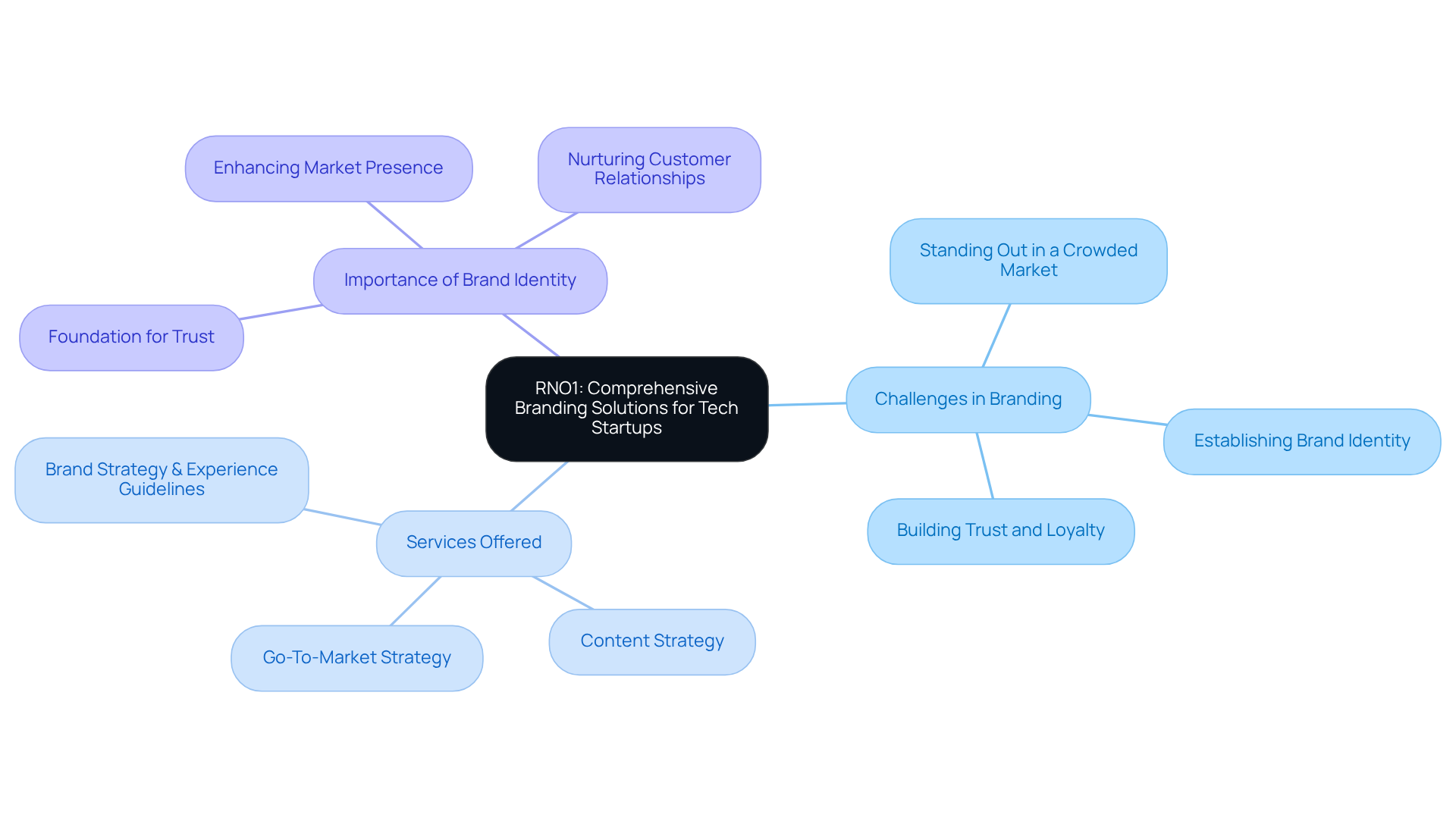
Google Ads: Targeted Paid Search Strategies for Increased Visibility
For technology startups, online advertising is not just a tool; it’s a lifeline to enhancing their web presence. Many new ventures struggle to connect with potential clients who are actively searching for their products or services. This challenge can feel overwhelming, especially when the competition is fierce. By utilizing focused strategies and emphasizing high-intent Google paid search keywords that resonate with their offerings, these emerging businesses can significantly improve their chances of success. It’s heartening to note that the average return on investment (ROI) for Google Ads in the tech industry is around 200% as of 2025, offering a glimmer of hope for those navigating this challenging landscape.
Incorporating ad extensions and location-based targeting can further elevate ad performance, helping startups stand out. Digital marketing specialists emphasize the importance of creating customized strategies that not only attract clicks but also foster meaningful engagement. Will Melton, President & CEO, highlights that optimizing for AI answers may require new skills, including the ability to craft highly authoritative content and use structured markup. This can feel daunting, but it’s a necessary step toward achieving visibility in a rapidly evolving market.
Successful paid search campaigns from emerging technology firms illustrate the power of and audience targeting. As the digital marketing environment evolves, especially with the rise of AI-driven search, it’s crucial for technology firms to adapt their strategies. This means allocating advertising budgets to new AI Mode/AI Overview ads from tech giants, alongside conventional Search ads. By investing in targeted Google paid search keywords, new businesses can improve their visibility and drive growth in their respective sectors. Remember, every step taken toward effective advertising is a step toward building a brighter future for your startup.
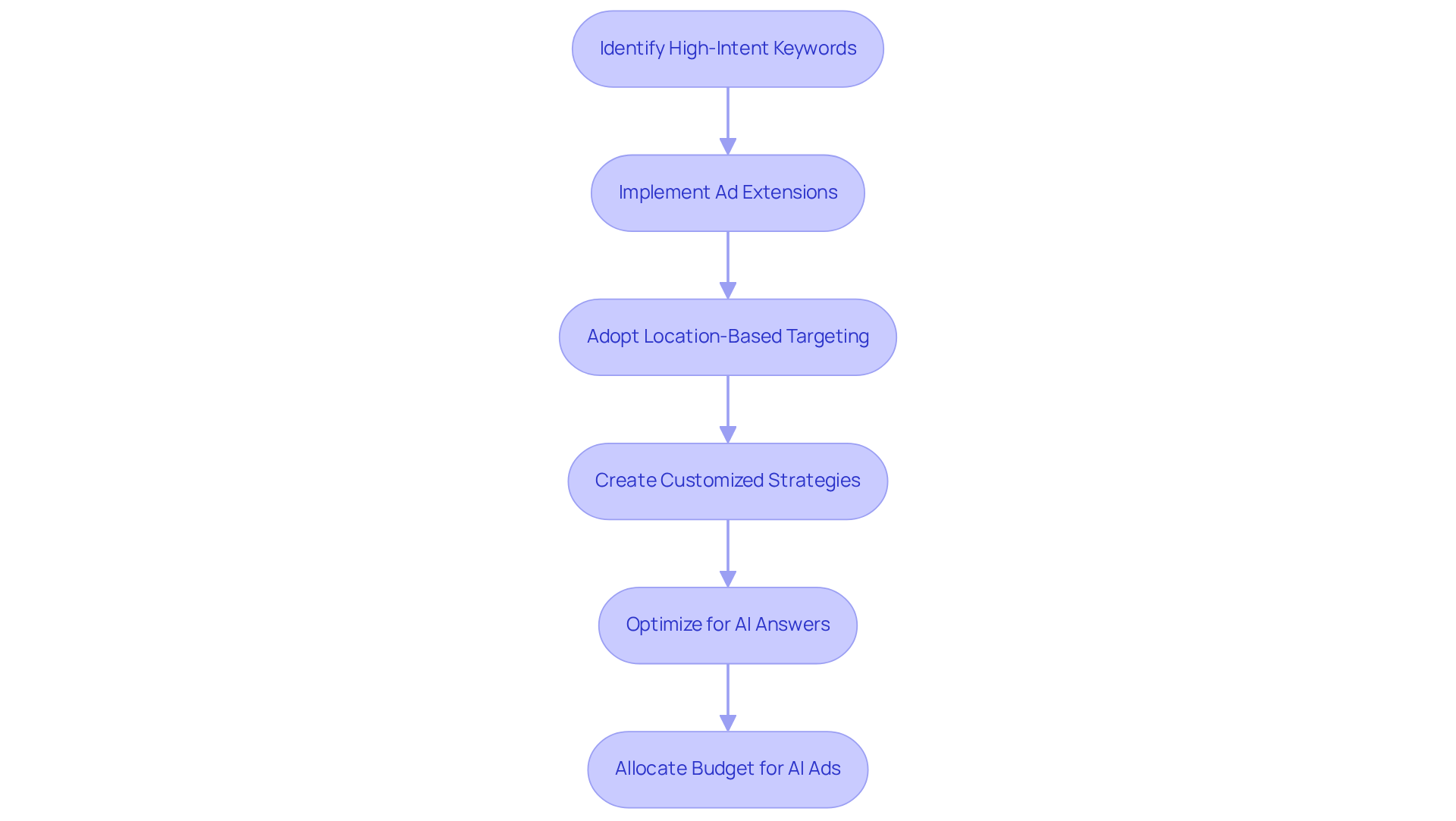
Google Keyword Planner: Discover High-Impact Keywords for Your Campaigns
For many technology companies, identifying high-impact keywords for Google Ads campaigns can feel overwhelming. The challenge lies in navigating search volume, competition, and emerging trends, which can often leave new businesses feeling lost. This can lead to missed opportunities to connect with their target audience effectively. However, Google Keyword Planner serves as a nurturing ally in this journey. By allowing users to filter results based on specific criteria, it ensures that the keywords chosen not only resonate with marketing objectives but also reflect the evolving landscape of consumer behavior.
It's essential to keep keyword lists fresh, as this adaptability is key to thriving in a dynamic market. In 2025, insights from industry experts emphasize the importance of focusing on long-tail keywords—these often yield higher conversion rates and face less competition. As many digital marketing experts have noted, implementing effective keyword strategies can significantly enhance visibility and engagement. This makes it crucial for new businesses to continuously adapt their approaches, fostering resilience in their marketing efforts.
Recent updates to the Keyword Planner have further enriched its functionality, offering more precise targeting and better alignment with user intent. This empowers new businesses to optimize their campaigns effectively, transforming what once felt like a daunting task into a manageable and rewarding experience. Remember, you are not alone in this; many have faced similar challenges and found success by embracing these tools. Together, we can and achieve your goals.
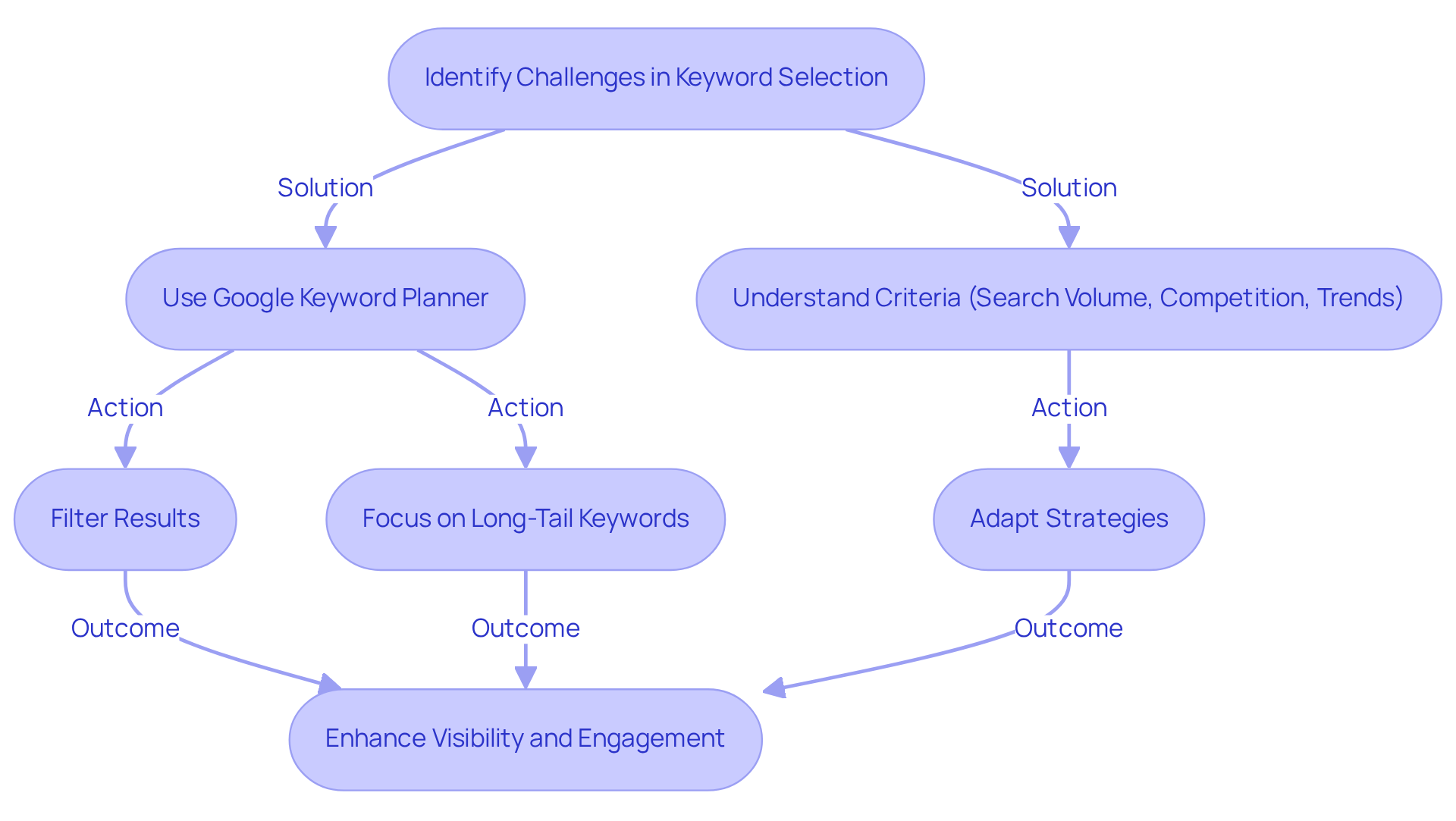
Google Ad Extensions: Boost Your Ad Visibility and Engagement
[Ad Extensions can be crucial tools](https://reflectdigital.co.uk/blog/the-impact-of-ad-extensions-on-click-through-rates-and-conversions) that significantly enhance the visibility and engagement of your advertisements. Many new businesses struggle to stand out in a crowded marketplace, and this can lead to frustration and missed opportunities. By incorporating additional elements such as site links, callouts, and structured snippets, you can provide more context about your offerings. This not only makes your ads more informative but also visually appealing, which is essential in capturing user attention. Increased visibility can lead to higher click-through rates (CTRs), as ads with extensions occupy more space on the search engine results page (SERP), effectively drawing in potential customers.
Consider structured snippets, which offer predefined headers that present specific details about your products or services. This allows potential customers to grasp essential information at a glance, alleviating the stress of sifting through countless options. Similarly, can highlight key features and unique selling points, further enticing users to engage with your ad. Promotion extensions showcase special offers or discounts, tapping into the principle of loss aversion to motivate users to act quickly, which can significantly drive conversions.
To truly enhance the effectiveness of Ad Extensions, it’s important to align your selections with your campaign goals and audience requirements. Think about using location extensions to leverage proximity bias, encouraging users to choose options that are geographically closer to them. Price extensions can also be beneficial, helping you filter out price-sensitive users while attracting those who are ready to make a purchase.
Digital marketing experts often emphasize that simply writing compelling ad copy and selecting the right keywords is no longer sufficient to stand out in today’s competitive landscape. As Sandra Adjei-Eyison wisely notes, "If you’re looking to increase ad engagement, and ultimately drive more conversions, you need to take full advantage of the additional tools that your PPC channel of choice provides." By strategically utilizing ad extensions, you can significantly enhance your ad relevance and conversion rates, ensuring you capture the attention of your desired audience effectively. Remember, you’re not alone in this journey; these tools are here to support you in achieving your goals.
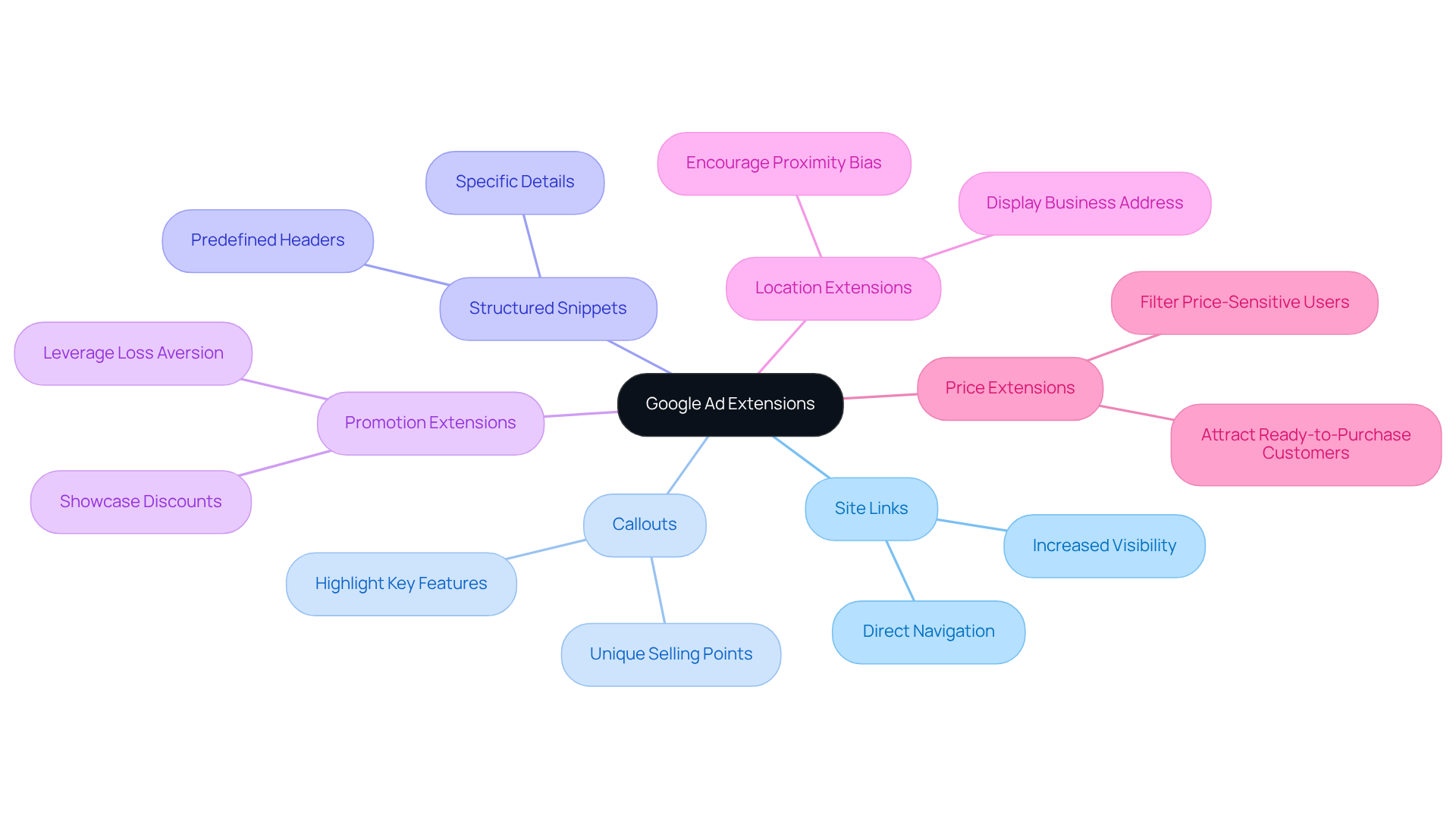
Google Remarketing: Re-Engage Visitors and Increase Conversions
In the fast-paced world of technology, many companies struggle to reconnect with visitors who have shown interest in their offerings. This disconnect can be disheartening, especially when potential customers seem to slip away. Google Remarketing offers a compassionate solution, allowing these companies to gently remind users of their brand as they navigate other sites. By delivering targeted advertisements, businesses can effectively encourage a return visit, fostering a sense of familiarity and connection.
For instance, in our heartening case study with Cirkul, we witnessed a remarkable 30% increase in conversions after implementing a targeted remarketing approach. This success story highlights the potential of reconnecting with those who have already expressed interest. To further enhance these efforts, it’s essential for new businesses to create engaging ad creatives that resonate with their audience's needs and preferences. As one expert wisely noted, 'Good marketing makes the company look smart. Great marketing makes the customer feel smart.' This insight underscores the importance of crafting captivating stories that draw users back in.
Moreover, it’s worth noting that conversion rates for remarketing efforts in technology startups can often exceed those of traditional initiatives, sometimes surpassing 50%. This statistic reflects the power of Remarketing not just to improve visibility but also to with prospective clients. By embracing this approach, technology companies can cultivate a supportive environment that encourages both engagement and growth.
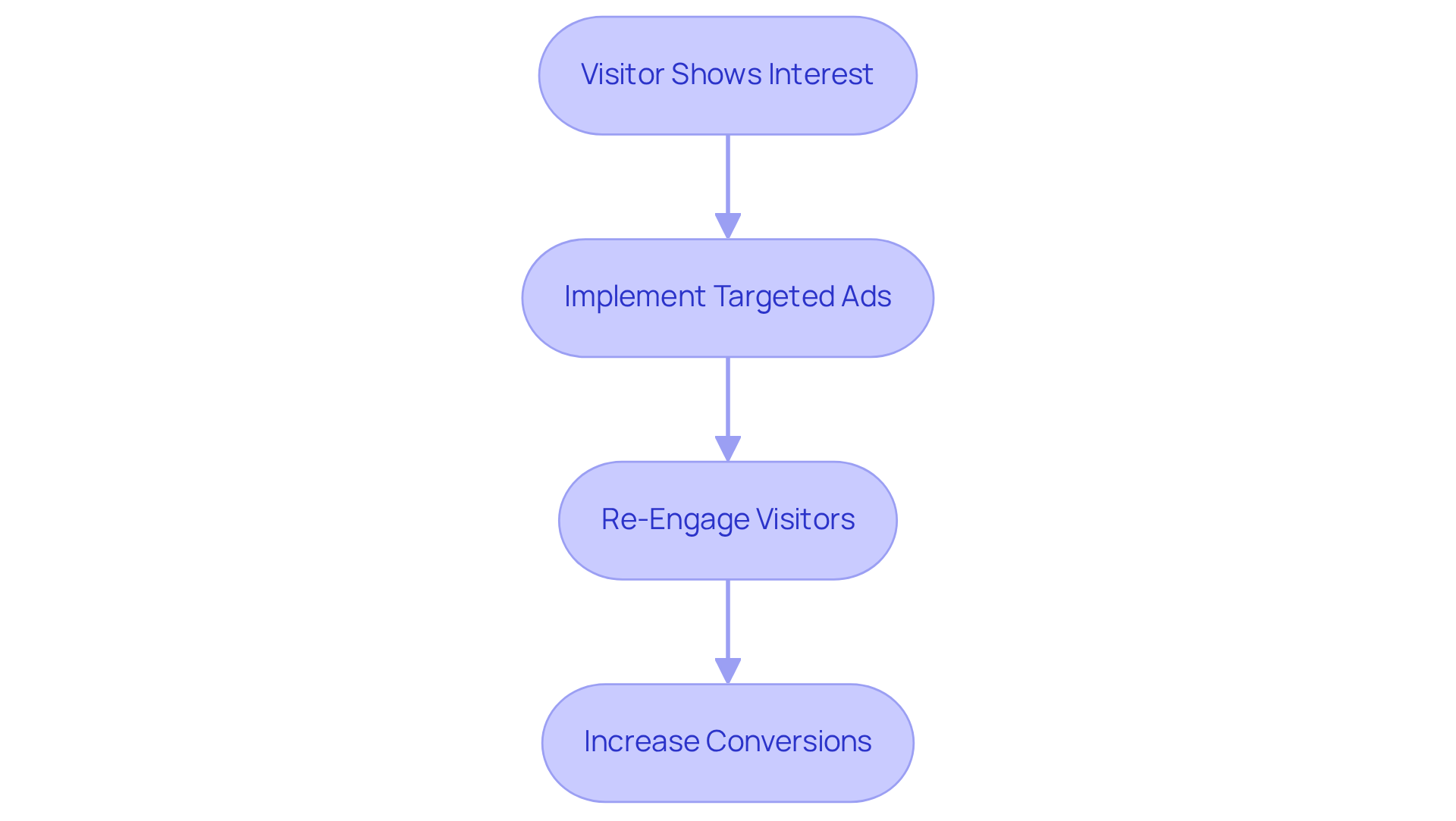
A/B Testing: Optimize Your Google Ads for Maximum Impact
A/B testing presents a significant challenge for many new businesses striving to enhance their advertising campaigns. It's not just about putting ads out there; it’s about understanding what truly resonates with your audience. By experimenting with various ad elements—think headlines, descriptions, and calls to action—you can uncover the variations that connect most deeply with your target market. This data-driven approach is not merely a strategy; it’s a pathway to continuous improvement in ad performance, leading to increased click-through rates (CTR) and conversions.
Consider this:
- 60% of companies recognize A/B testing as essential for improving their conversion rates.
- The top 10% of Ads marketers even achieve an impressive 11.45% conversion rate.
- For startups, adopting A/B testing isn’t just a good idea; it should be a standard practice.
- It enhances ROI and fosters a culture of experimentation that is vital for long-term success.
As industry expert Michael Braun wisely notes, focusing on one modification at a time can simplify the process of understanding what drives success or failure. This makes A/B testing a . However, it’s important to acknowledge the challenges that come with it. Startups must be aware of the necessity for a large sample size to achieve statistical significance, which is crucial for drawing meaningful conclusions.
In this journey, remember that you’re not alone. Engaging in A/B testing can feel overwhelming, but it is a step towards clarity and growth. Embrace the process, and let it guide you toward a more successful advertising strategy.
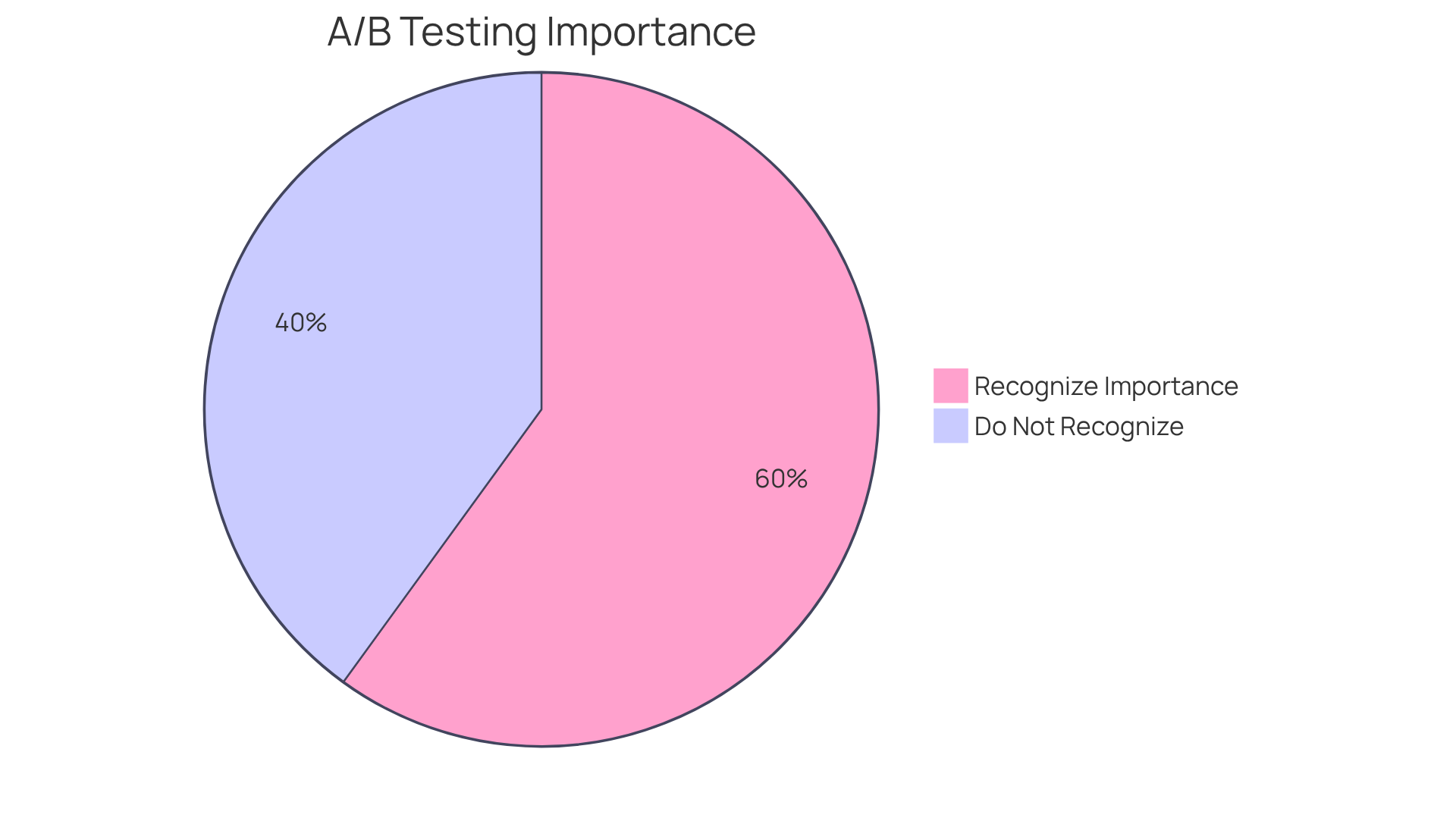
Google Conversion Tracking: Measure Your Campaign Success
For many startups, conversion tracking from the search engine giant can feel overwhelming. Without it, assessing the effectiveness of your advertising efforts becomes a daunting task. Imagine pouring resources into ads, only to realize later that they’re not reaching the right audience or driving the desired actions. This uncertainty can lead to frustration and wasted investment.
However, by tracking user actions—such as purchases, sign-ups, or downloads—startups can uncover valuable insights into their ads’ performance. This information is not just data; it’s a lifeline for making informed decisions. Understanding which initiatives generate the most conversions can empower you to and focus your efforts where they matter most.
To navigate this challenge, it’s essential for startups to ensure that conversion tracking is set up correctly. This step is crucial for accurately assessing advertising effectiveness. By embracing this practice, you can transform uncertainty into clarity, allowing your startup to thrive in a competitive landscape. Remember, you’re not alone in this journey; many founders have faced similar hurdles and found success through thoughtful tracking and analysis.
![]()
Negative Keywords: Enhance Targeting and Reduce Wasted Spend
Negative keywords can be a game changer for tech startups trying to make the most of their advertising budgets. It’s easy to feel overwhelmed by the vast options available, but by thoughtfully excluding irrelevant terms, you can enhance your ad targeting significantly. This means your ads can reach users who are genuinely interested in what you offer, leading to better conversion rates. Not only does this focused approach boost efficiency, but it also helps you avoid unnecessary spending, allowing you to allocate your resources more effectively.
It’s essential to regularly review and update your negative keyword lists to stay aligned with your evolving marketing strategies. Google Ads allows startups to create up to 20 shared negative keyword lists, with a total capacity of 100,000 negative keywords. This flexibility gives you precise control over ad visibility, helping filter out irrelevant queries that could otherwise drain your budget.
Digital marketing experts highlight that using negative keywords effectively can lead to increased click-through rates (CTR) and improved quality scores. For example, a furniture retailer might choose to exclude the term 'cheap' to attract users who are looking for premium products. This not only enhances ad relevance but also protects your brand's perception. By applying negative keywords with care, new businesses like yours can improve performance, reduce irrelevant traffic, and focus budgets on higher-value opportunities.
Incorporating automation tools can also streamline your management of negative keywords, allowing for real-time adjustments based on performance metrics. This proactive strategy not only but ensures your campaigns remain adaptable to market changes. Ultimately, effectively leveraging negative keywords can lead to significant savings—clients have shared that they saved 10-20% of their budgets in just minutes by implementing this thoughtful strategy. Remember, you’re not alone in this journey; many tech startups face similar challenges, and by sharing experiences, we can all grow together.
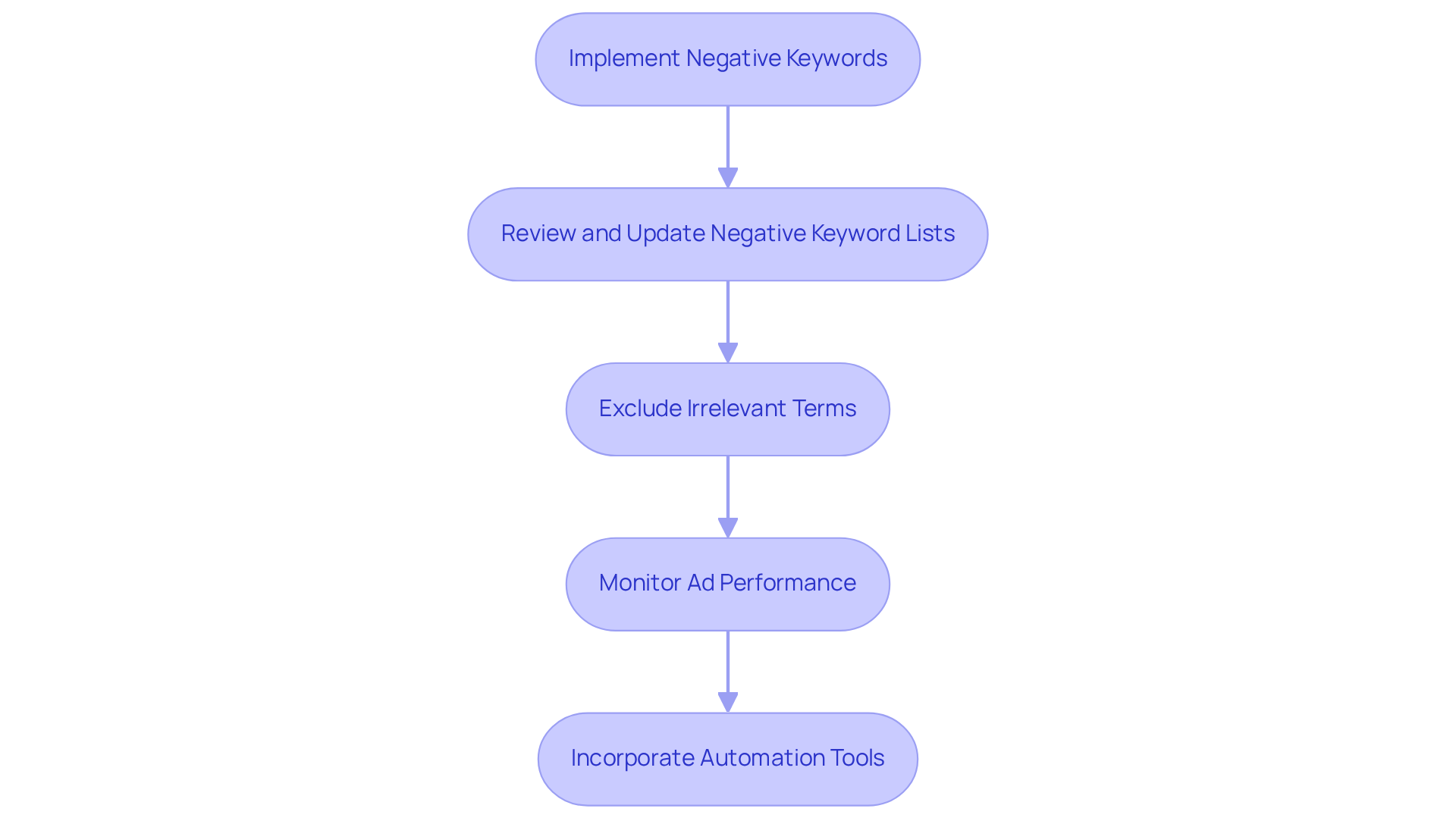
Google Ad Scheduling: Maximize Visibility During Peak Times
For new businesses, navigating the world of online advertising can often feel overwhelming. It's a common struggle—finding the right moments to connect with potential customers can make all the difference. When you think about it, displaying ads during , when your target audience is most engaged, is crucial. Google Ad Scheduling can be a lifeline in this regard. By leveraging performance data, you can identify these high-engagement periods and adjust your ad schedules accordingly. This thoughtful approach not only enhances visibility but also significantly increases your chances of conversions. In fact, paid search visits are 35% more likely to convert than organic search visits.
However, the journey doesn't end there. Ongoing observation of your ad performance is essential. By continuously refining your scheduling strategies, you can achieve optimal results. As Jack Shepherd, Co-Founder & Marketing Director, insightfully points out, '65% of people click on these ads when they’re looking to make a purchase.' This statistic truly underscores the importance of effective ad scheduling. Moreover, with 61.9% of clicks on Ads coming from mobile devices, understanding peak engagement times is vital, especially for tech startups eager to enhance visibility and foster engagement.
The impact of Ads is undeniable, with a staggering revenue of $237.9 billion generated in 2023. This figure not only highlights the platform's efficiency but also emphasizes the significance of utilizing its features, such as ad scheduling, to support your growth. Embracing these strategies can empower you to connect more meaningfully with your audience, paving the way for success in your entrepreneurial journey.
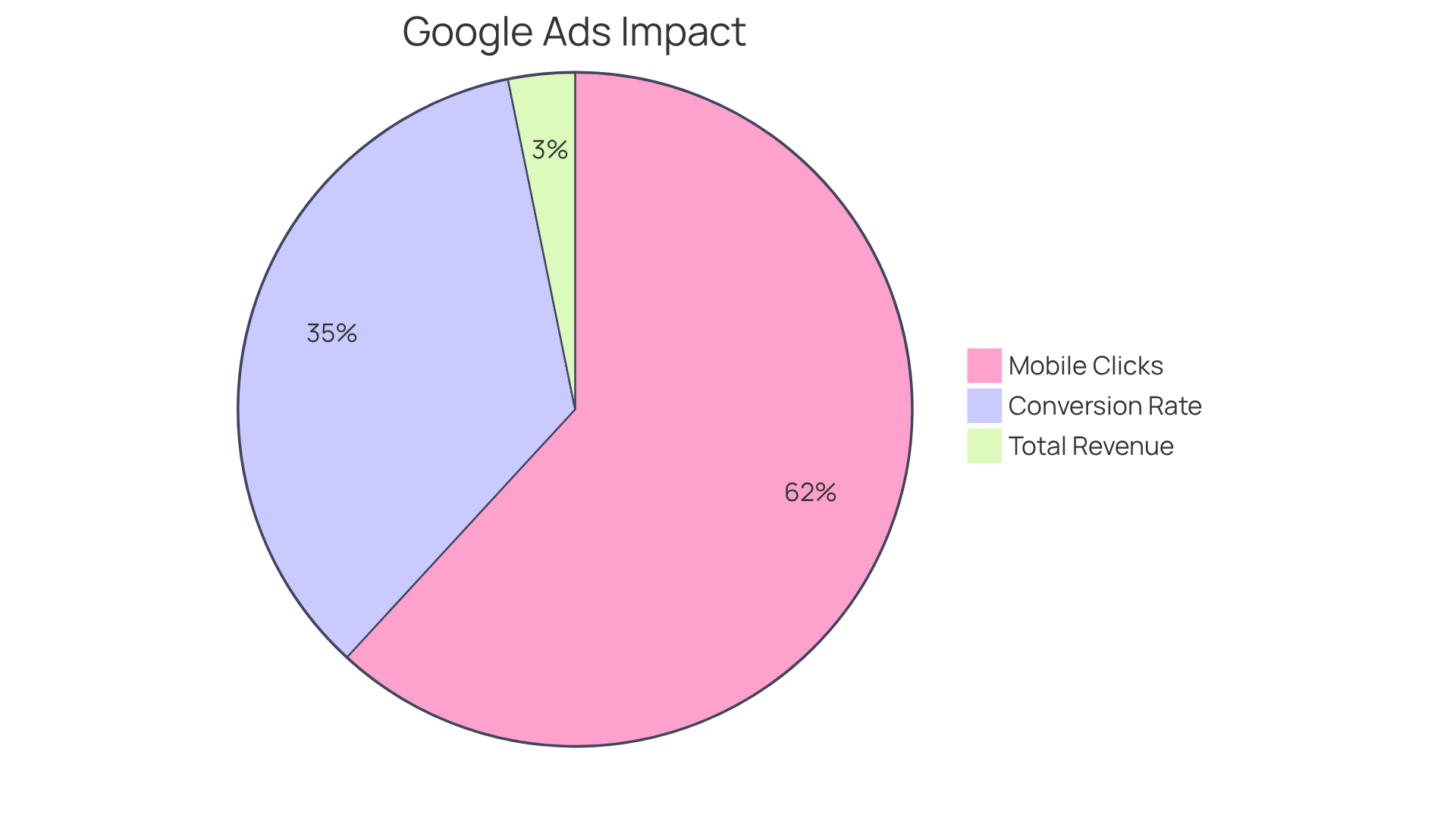
Google Performance Metrics: Analyze and Improve Your Campaigns
For many tech startup founders, navigating the complexities of advertising can feel overwhelming. Google performance metrics, such as Google paid search keywords, often seem like a daunting puzzle, yet they are essential for assessing the effectiveness of your advertising efforts. It's crucial to focus on key metrics such as:
- Click-through rates (CTR)
- Conversion rates
- Cost per acquisition (CPA)
- Return on ad spend (ROAS)
By consistently assessing these metrics, you can identify areas that need enhancement and make informed, data-driven choices that truly improve your advertising strategies.
Consider this: the average CTR for tech new ventures is projected to be around 6.66%. This figure serves as a helpful benchmark for assessing your campaign performance. Additionally, the average conversion rate for Google paid search keywords stands at 3.2%, providing further context for evaluating ad effectiveness. As digital marketing expert Josh McCoy points out, setting up conversion goals properly in Google Analytics is crucial; incorrect setups can lead to misleading conversion reports, which can be frustrating.
Moreover, it’s important to recognize that 67% of analytics leaders see organizational culture as a major obstacle to becoming data-oriented. This highlights the challenges new businesses face in executing effective data-driven strategies. However, by comprehending and examining these performance metrics, you can enhance your strategies, leading to better outcomes and higher ROI.
In the words of Avinash Kaushik, adopting a data-with strategy instead of a purely data-first approach can significantly enhance your campaign effectiveness. This approach allows you to in a rapidly evolving market. Remember, you are not alone in this journey; by embracing these insights and fostering a supportive community, you can navigate the world of digital marketing with confidence and success.
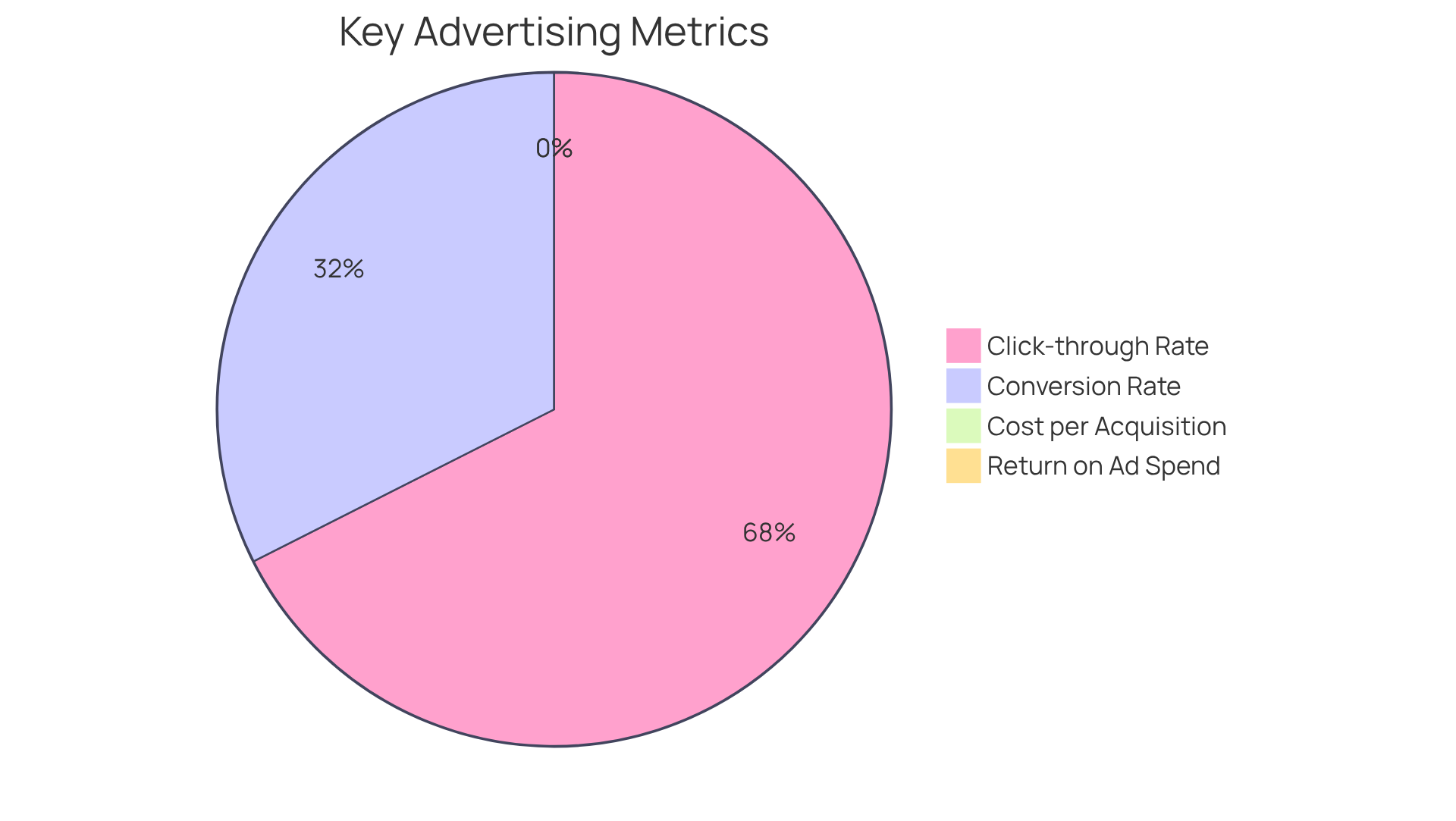
Conclusion
In the competitive landscape of tech startups, achieving visibility and growth can often feel overwhelming. The challenge of navigating digital marketing is real, and many founders struggle to find their footing. However, by leveraging essential Google paid search keywords, startups can not only enhance their visibility but also foster meaningful connections with their audience.
Understanding the intricacies of branding, targeted advertising, and performance metrics is crucial. These elements can seem daunting, but they are key to overcoming the challenges of digital marketing. Insights shared throughout this article highlight how a thoughtful approach to Google Ads can significantly boost a startup's chances of success in a crowded marketplace.
We discussed the importance of a strong brand identity and the power of targeted paid search strategies. Tools like Google Keyword Planner and Ad Extensions are invaluable in optimizing campaigns, while the significance of remarketing, A/B testing, conversion tracking, and the use of negative keywords cannot be overlooked. Each of these components plays a vital role in refining advertising efforts, ensuring startups can reach their audiences effectively.
Embracing these strategies and tools empowers tech startups to improve their visibility and cultivates a culture of continuous improvement and adaptation. By taking proactive steps to implement these practices, startups can build a robust online presence and establish lasting relationships with customers. The journey may be challenging, but with the right approach and support, success is not just a dream—it is within reach. Remember, you are not alone in this journey; every step you take brings you closer to your goals.
Frequently Asked Questions
What challenges do technology startups face in establishing a brand identity?
Technology startups often struggle with creating a strong brand identity, which can lead to uncertainty and frustration in a crowded market. A weak brand can negatively impact visibility, trust, and customer loyalty.
How does RNO1 assist tech startups with branding?
RNO1 offers tailored branding solutions, including brand strategy, content strategy, and go-to-market strategy, to help startups resonate with their target audience and build a compelling brand narrative.
Why is a robust brand identity important for startups?
A strong brand identity lays the foundation for building trust and loyalty among consumers, which is essential for long-term success in the market.
What is the average ROI for Google Ads in the tech industry?
As of 2025, the average return on investment (ROI) for Google Ads in the tech industry is around 200%.
What strategies can technology startups use to improve their online advertising?
Startups can use focused strategies, high-intent Google paid search keywords, ad extensions, and location-based targeting to enhance their online visibility and engagement.
What role does Google Keyword Planner play for tech companies?
Google Keyword Planner helps technology companies identify high-impact keywords by filtering results based on specific criteria, aiding in effective targeting and alignment with marketing objectives.
Why is it important to focus on long-tail keywords?
Long-tail keywords often yield higher conversion rates and face less competition, making them a valuable focus for new businesses looking to enhance visibility and engagement.
How can startups navigate the complexities of digital marketing?
By continuously adapting their keyword strategies, utilizing tools like Google Keyword Planner, and investing in targeted advertising, startups can improve their marketing efforts and achieve growth.




